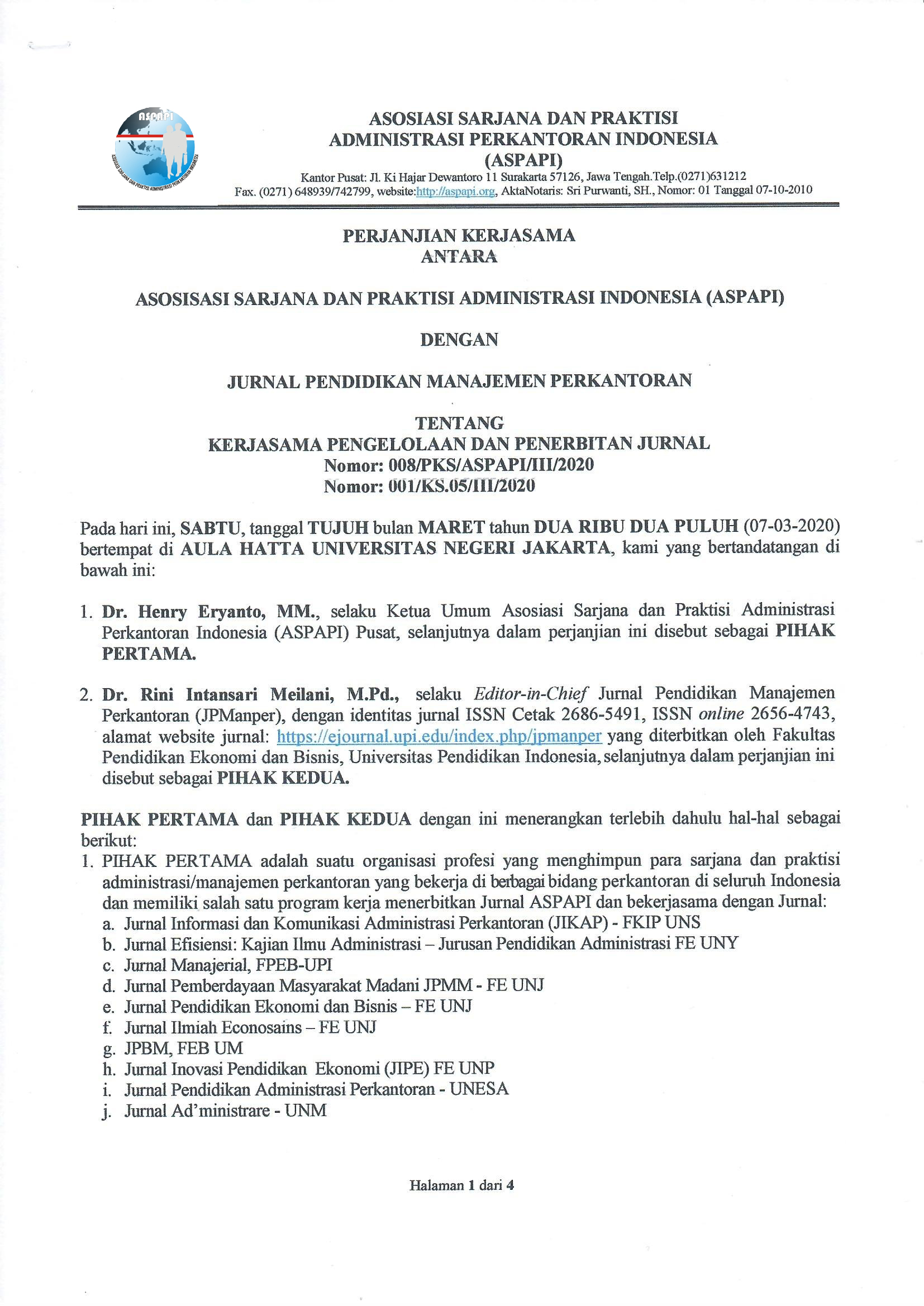PENGELOLAAN KELAS SEBAGAI DETERMINAN TERHADAP HASIL BELAJAR
Abstract
Teacher classroom management is the one of external factor student achievement. So strongly relationship among classroom management with student achievement are something denied. Research finding show that hypothesis about relationship classroom management with student achievement is significant. Meaning that the best classroom management by teacher will gaining the best students achievement. On the contrary that if classroom management is doing bad, so the students achievement will bad too. Thus it can be said that classroom management is one of determinant factors of student achievement.
ABSTRAK
Pengelolaan Kelas oleh guru merupakan salah satu factor eksternal penentu hasil belajar siswa, Oleh karena itu keterkaitan yang erat antara pengelolaan kelas dengan hasil belajar siswa merupakan hal yang tak dapat disangkal, Hasil Penelitian menunjukkan bahwa Hipotesis adanya pengaruh pengelolaan kelas terhadap hasil belajar siswa terbukti sisgnifikan. Hal tersebut dapat bermakna bahwa semakin terampil guru dalam mengelola kelas, maka hasil belajar para siswanya akan semakin baik, demikian sebaliknya jika pengelolaan kelas yang dilakukan guru kurang baik, maka hasil belajar para siswanya akan tidak baik pula. Dengan demikian dapat dinyatakan jika pengelolaan kelas merupakan salah satu variable penentu terhadap hasil belajar.
Keywords
Full Text:
PDFReferences
Abbot, R. D., O'Donnell, J, H., J, D. H., K, G. K., & Catalano, R. F. (1998). Changing teaching practices to promote achievement and bonding to school. American Journal of Orthopsychiatry , 542-552.
Bloom, B. S. (1956). Taxonomy of Educational Objective: Handbook 1, Cognitive Domain. New York: David McKay.
Chih, L. H., & Chih, C. F. (2014). Preceived Classroom Management and Student Learning Motivation In Social Studies Of Taiwan Junior High School Student. European Journal of Research in Social Science, II, 40-51.
Cooper, J. M. (1995). Classroom Teaching Skills. Lexington: D.C. Heath and Company.
Dimyati, & Mudjiono. (2006). Belajar dan Pembelajaran. Bandung: Alfabeta.
Dimyati, & Mudjiono. (2013). Belajar & Pembelajaran. Jakarta: Rineka Cipta.
Djamarah, S. B. (2011). Psikologi Belajar. Jakarta: Rineka Cipta.
Doyle, W. (2011). Classroom organization and management. (In Mertin C. Wittrock Handbook of Reaserch on Teaching ed.). New York: MacMillan.
Emmer, E. T., & Stough, L. M. (2001). Classroom Management: A Critical Part of Educational Psychology, With Implication for Teacher Education. Educational Psychologist, 103-112.
Ezeldin, S. (2013). International Accreditation for Enginering Programs: Mission, Learning Objectives and Outcomes. Procedia Social and Behavioral Sciences, 102, 267
Gibbs, A., Kennedy, D., & Vickers, A. (2012). Learning Outcomes, degree profiles, tuning project and competences. Journal of the European Higher Education Area, 72-83.
Gudeva, L. K., Dimova, V., Daskalovska, N., & Trajkova, F. (2012). Designing descriptors of learning outcomes for Higher Education Qualification. Procedia Social and Behavioral Sciences, 46, 1306-131
Jennings, P. A., & Greenberg, M. T. (2009). The Prosocial Classsroom: Teacher Social and Emotional Competence in Relation to Student and Classroom Outcomes. Review of Educational Research
Kennedy, D., Hyland, A., & Ryan, N. (2009). Academic Achievement Prediction: Role of Interest in Learning and Attitude towards School. International
M. Warschauer and C. Meskill (2000). Technology and second language learning, In J. Rosenthal (Ed.). Handbook of Undergraduate Second Language Education, 303-318.
McNeely, C. A., Nonnemaker , J. M., & Blum, R. W. (2002). Promoting student connectedness to school: Evidence from the National Longitudinal Study of Adolescent Health. Journal of School Health, 72, 138-146.
Mushtaq , I., & Khan, S. N. (2012). Factors affecting student academic performance. Global Journal of Management and Business Research, 12(9), 16-22.
Omomia, A. O., & Omomia, A. T. (2014). Perceived Impact Of Classroom Management On Effective Teaching: A Study Of Five School In Education District 11, Lagos State, Nigeria. European Scientific Journal, 309-320.
Osakwe, R. N. (2014). Classroom Management: A Tool for Achieving Quality Secondary School Education in Nigeria. International Journal of Education, 6, 58-68.
Sabanci, A., Ozyildirim, G., & Imsir, R. (2014). The Effect of ICT Usage on the Classroom. International Review of Social Sciences and Humanit, 7, 232-245.
Slameto. (2010). Belajar dan faktor-Faktor yang Mempengaruhinya. Jakarta: Rineka Cipta.
Sudjana, N. (2010). Penilaian Hasil Proses Belajar Mengajar. Bandung: Remaja Rosdakarya.
Sukmadinata, N. S. (2005). Landasan Psikologi Proses Pendidikan. Bandung: Rosdakarya.
Tarman, S. V. (2011). Differentiated teaching and constructive learning approach by the implementation of ICT in mixed ability classrooms. Ahi Evran University Journal of Education Faculty, (KEFAD), 12(1), 169-184.
Tsegay, S. M., & Ashraf, M. A. (2015). The influence of senior secondary school teacher on students achievment in Gao-Kao. International Journal of Research Studies in Education, 4, 67-76.
Usman, M. U. (2003). Menjadi Guru Profesional. Bandung: PT Remaja Rosdakarya.
DOI: https://doi.org/10.17509/jpm.v3i2.11759
Refbacks
- There are currently no refbacks.
Copyright (c) 2018 Jurnal Pendidikan Manajemen Perkantoran
Jurnal Pendidikan Manajemen Perkantoran Statcounter View My Stats



